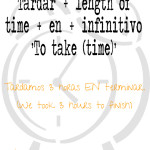Do you know how to use the verbs “tardar”, “llevar” and “durar” in time expressions? Their use is fairly common to express how long it takes to do something, how long something goes on for or how long something has been going on. Let’s see the best way to use them:
- Durar: ‘to go on, to last’
 We use ‘durar‘ + length of time to express how long something lasts.
We use ‘durar‘ + length of time to express how long something lasts.
– La película dura dos horas.
– The movie lasts (for) two hours.
– ¿Cuánto dura el vuelo?
– How long is the flight? / How long does the flight take?
– La conferencia durará cuatro días.
– The conference will last four days.
- Tardar: ‘to take (time)’
 We use ‘tardar’ + amount of time + en + infinitive to say how long it takes for someone (person, animal or thing) to do something.
We use ‘tardar’ + amount of time + en + infinitive to say how long it takes for someone (person, animal or thing) to do something.
– Tardamos tres horas en llegar al pueblo.
– We took three hours to get to the village.
– ¿Cuánto se tarda en llegar de Madrid a Burgos en autobús?
– How long does it take to go from Madrid to Burgos by bus?
‘Tardar‘ also means to take too much time, as in delaying.
– Pedro tarda en llegar.
– Pedro is late in arriving.
- Llevar
 – ‘Llevar‘ + time + gerund: ‘to be, to take’
– ‘Llevar‘ + time + gerund: ‘to be, to take’
We use this expression to refer to how long an action has been going on.
– Llevo media hora esperando.
– I’ve been waiting for half an hour.
– ¿Cuánto tiempo llevas buscando a tus padres biológicos?
– How long have you been looking for your biological parents?
– ‘Llevar’ + time + sin + infinitive: ‘to go / to be for + length of time + without’
– Lleva dos días sin comer.
– He hasn’t eaten for two days.
– ‘Llevar’ + amount of time (+ en) + place
We use this expression to say how long someone or something has been somewhere.
– La estatua lleva tres años en la plaza.
– The statue has been here for three years.
– ¿Cuánto tiempo llevas aquí?
– How long have you been here?



A really important part of Spanish that English speakers tend to make mistakes with, as we have a different way of expressing it.
I also like the way you explain it in a very simple way; I often have problems explaining this to my students and being able to give them clear examples of when to use “llevo” or “tarda”. So I’ll use some of this advice in the future when teaching.
Thanks
Johnny
Glad you find it useful! 🙂
Traveling to work on metro ligero is now very productive with these films. Thanks!
Great!
I am thinking that maybe you would be interested in having a short email in your inbox every morning with some Spanish listening activities… Head to Compass Spanish/ to see if you would like to make your commuting time even more productive!!! 🙂
Maria, gracias por esta información y también por haberlo presentado en un video. Explicaste todo muy bien pero todavia sigo con algunas dudas las cuales explicaré en inglés: Gracias
Te pregunto lo sgte:
How would you use “llevar” + amount of time (+en) + place —— in the PAST? Would you use the Preterite o the Imperfect?
For example: The statue was in the plaza for three years. La estatua LLEVO/LLEVABA tres años en la plaza.
Which tense would you use if you were to say that sentence that way? Or would you say it like that? Of course, it might be easier just to say “La estatua estaba en la plaza por 3 anos.”
That reminds me, there are times you can say a time expression by just saying POR + amount of time. But when and which tenses are used with this, is vague to me.
Thanks
We would use the imperfecto, for example: Llevaba dos meses estudiando español, because it is a description of a habit or continuous action. The use of “por” and amount of time is correct but not used in Peninsular Spanish, we use words as “durante”, “hace”, “desde hace”. In your example, we would say: La estatua estaba en la plaza desde hace 3 años, or La estatua llevaba 3 años en la plaza.
Hello I am learning spanish and i am really confused by the verb tardar. I have a sentence that reads…Vuestros amigos no tardaran en llegar. Could you please help me out with this?
Many thanks.
Lorna
Tardar = to take time in doing something
Your friends won’t take long to arrive